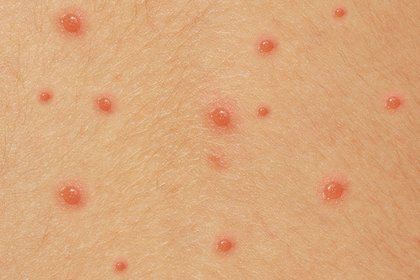Infection Prevention and Control Team
Lanchester Road Hospital
Lanchester Road
Durham
DH5 1RD
Phone: 0191 333 3584
Email: [email protected]

What is chickenpox?
Chickenpox is a highly contagious virus that mostly affects children, but you can get it at any age. Around 90% of people who have not previously had chickenpox will become infected when they come into contact with the virus.
Some children have only a few spots, but other children can have spots that cover their entire body. These are most likely to appear on the face, ears and scalp, under the arms, on the chest and belly, and on the arms and legs.
The best way to prevent chickenpox is to get the chickenpox vaccine.
The spots start appearing around 1 to 3 weeks after you caught chickenpox.
Signs and symptoms?
Chickenpox happens in 3 stages.
Stage 1
- Small spots appear
- Spots can spread or stay in small area
- Spots can be red, pink, darker or the same colour as surrounding skin but may be harder to see on a different skin tone
Stage 2
- Spots become blisters
- Itchy blisters
Stage 3
- Blisters become scabs (some scabs are flaky while others leak fluid)
Other symptoms that you may have before or after the rash appears:
- High temperature
- Aches and pains
- Loss of appetite
- Generally feeling unwell
It usually gets better after 1 to 2 weeks without needing to see a doctor.
How does it spread?
You can spread chickenpox to other people from 2 days before spots appear until they have all formed scabs. The virus can be spread from person to person via direct contact with the blisters, saliva or mucus of an infected person. The virus can also be transmitted through the air by coughing and sneezing.
The virus may be transferred by touching the surface or object in the environment that has been contaminated, then touching your face.
How is chickenpox treated?
There is no specific treatment for chicken pox, but there are pharmacy remedies that can alleviate symptoms such as paracetamol, calamine lotion and cooling gels.
Adults with chickenpox may benefit from taking antiviral medicine if treatment is started early in the course of the illness.
Do
- Do drink plenty of fluid (try ice lollies) to avoid dehydration
- Do take paracetamol to help with the pain
- Do cut fingernails to try and prevent scratching
- Do use cooling creams or gels from a pharmacy
- Do speak with a pharmacist about antihistamine medicine to help with the itching
- Do bathe in cool water and pat the skin dry (do not rub)
- Do dress in loose fitting clothes
Don’t
- Don’t use ibuprofen unless advised to do so by a doctor
- Don’t give aspirin to children
- Don’t go near newborn babies, people who are pregnant and people with a weakened immune system as it can be dangerous for them
- Don’t scratch the spots as scratching can cause scarring
When can I return to work/school?
You will need to stay off work, school or nursery until all the spots have formed a scab. This is usually 5 days after the spots have appeared.
Where can I get further information?
During your hospital stay if you or your family require further information or wish to discuss this, please ask the Ward Staff or the Infection Prevention and Control Nurse.
L1172, v1, 25/04/2022 (archive 25/04/2025)